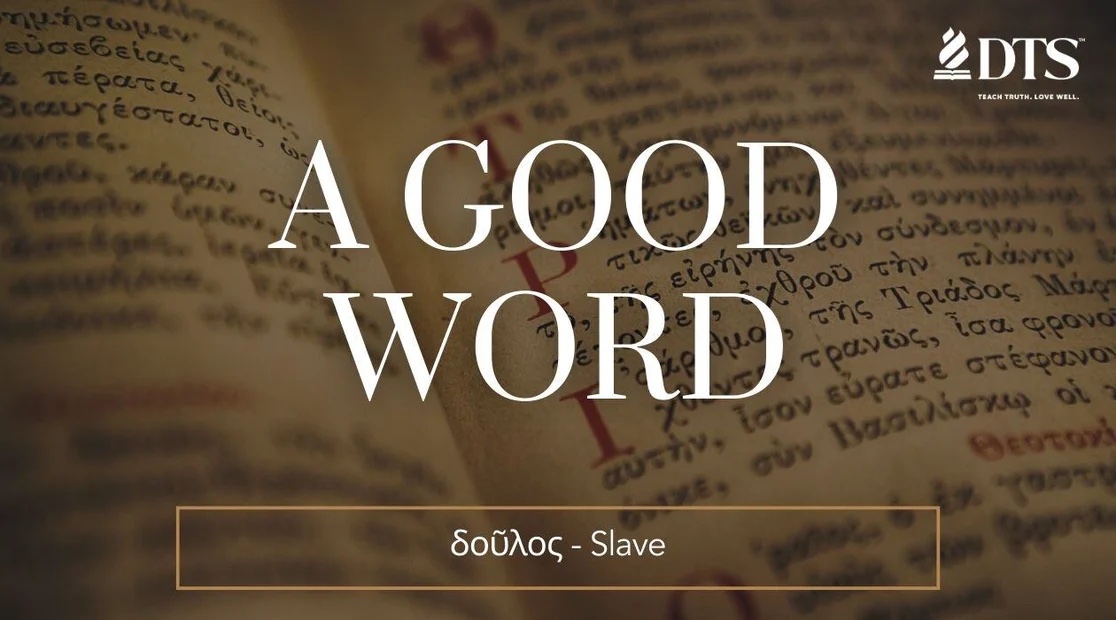A Good Word: δοῦλος — Slave

Given the historical and cultural context, the term “slave” (δοῦλος) evokes only negative emotions and responses. The New Testament was written at a time when slavery was widespread, so the concept of slavery was familiar to people in the first century. In fact, the Roman empire was a notorious slave owning society. With this in mind, it is not surprising that the word “slave” (δοῦλος) appears 126 times in 118 verses. Many verses refer to enslaved people, including those in the church. Indeed, this is why it is peculiar to find New Testament authors claiming to be “slaves” of God or Christ: Paul (Romans 1:1; Galatians 1:10; Philemon 1:1; Titus 1:1), Peter (2 Peter 1:1), James (1:1), and John (Revelation 1:1).
The word “slave” (δοῦλος) is used in various other ways as well. For example, Paul informs believers that they were once “slaves to sin” and encourages them to become “slaves to obedience” (Rom 6:15-20; see also John 8:34). This is especially astounding considering passages where believers are told that they are no longer slaves but friends (John 15:15) or children of God (Galatians 4:7; this can only be explained by noting that different metaphors reveal different aspects of our relationship with God). Not only do biblical authors identify themselves as “slaves,” but they say that this is something for which Christians should aspire. Peter ironically tells his readers to use their freedom as “God’s slaves” or “slaves of God” (ὡς θεοῦ δοῦλοι; 1 Peter 2:16).
Before we can appreciate the full impact of Peter’s statement, we need to recognize the horrific lives of enslaved peoples. Slavery all boils down to one thing: ownership. Slave systems may differ but this they all share. The notion of one human “owning” another is appalling. Imagine having no control over your actions, relationships, or even your own body. Enslaved people could be killed without legal consequences (unless the enslaved person was owned by another in which case there may be economic penalties). They were forced to do the most menial and difficult tasks. In fact, in the eyes of society, enslaved people were not people at all. Rather, they were property. Slavery is truly among the worst evils that humanity has inflicted upon itself. There is no endorsement or acceptance of the slave system here.
So, why would anyone want to associate themselves with this system? The answer can only be found in the character of the master. It is purely to put the focus on the character of God.
No one of sound mind would voluntarily place themselves in a slave relationship. Interestingly, many translations avoid this connection by translating δοῦλος as “servants” (or similar) (in 1 Peter 2:16, see ESV, NRSVue, NKJV, NASB20). This is unfortunate and fails to bring out an amazing feature of this and other passages. Becoming a slave of God is exactly what the biblical authors did and what we are encouraged to do. This can only be because the master, Jesus Christ, is so trustworthy, loving, and faithful that we can fully give ourselves to Him. In fact, Christ himself understands our situation. His incarnation is described as “taking on the form of a slave” (μορφὴν δούλου λαβών; Philippians 2:7). Unlike earthly masters, Christ loves us, sacrificially died for us, and will take care of us.
Dr. Fantin believes an accurate understanding of God’s Word will enable the believer to grow in his or her relationship with Christ, to love God and others, to bring Christ’s love to a lost world, to build up the church, and most importantly, to glorify God. He is committed to teaching exegetical method in order to help students understand, apply, and teach the Bible in order to achieve these goals. Dr. Fantin’s research interests include the first-century world, Greek language and linguistics, exegetical method, and exegesis of the Gospel of John and Hebrews. He and his wife, Robin, have two children: Jillian and David.
(1) Estimates are impossible to make with any precision. Concerning Roman Italy, Neville Morley suggests that enslaved people may have accounted for as much as 35% of the population. “Slavery under the Principate,” Cambridge World History of Slavery, vol 1 [CUP, 2011], 265. (2) Reference Matthew 8:9; Mark 12:2; Luke 7:2; John 18:18; 1 Corinthians 7:21; Galatians 3:28; Ephesians 6:5; Colossians 3:11, 22; 1 Timothy 6:1; Titus 2:9; Philemon 16; Revelation 6:15.
About the Contributors

Joseph D. Fantin
Dr. Fantin believes an accurate understanding of God’s Word will enable the believer to grow in his or her relationship with Christ, to love God and others, to bring Christ’s love to a lost world, to build up the church, and most importantly, to glorify God. He is committed to teaching exegetical method in order to help students understand, apply, and teach the Bible in order to achieve these goals. Dr. Fantin’s research interests include the first-century world, Greek language and linguistics, exegetical method, and exegesis of the Gospel of John and Hebrews. He and his wife, Robin, have two children: Jillian and David.
